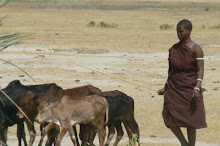 Much of the violence in the early hours of Sunday was centred around the village of Dogo Nahawa, near the northern city of Jos, where a journalist counted a total of 103 bodies amid the smouldering embers.
Much of the violence in the early hours of Sunday was centred around the village of Dogo Nahawa, near the northern city of Jos, where a journalist counted a total of 103 bodies amid the smouldering embers.Another 18 bodies were counted at the morgue in Jos city -- the scene of inter-religious riots in January which left several hundreds dead.
"There has been an attack on Dogo Nahawa. Over a hundred people have been killed -- most of them women and children," said a government official who spoke on condition of anonymity.
"Some of the children are less than one year old," he added.
Acting President Goodluck Jonathan, briefed by the nation's police chief Ogbonnaya Onovo on the situation, has placed security agencies in the region on a red alert, an official statement said in Abuja.
"The Acting President has placed all the security services in Plateau (State) and neighboring states on red alert so as to stem any cross border dimensions to this latest conflict," the statement from his office said.
"He has also directed that the security services undertake strategic initiatives to confront and defeat these roving bands of killers," it added.
Dozens of houses were also set ablaze in similar raids on the nearby villages of Ratsat and Zot, all less than 10 kilometres (seven miles) from Jos and home to members of the Berom ethnic group.
Traumatised residents accused the local authorities of turning a blind eye to the bloodshed blamed on members of the rival Fulani clan.
Peter Gyang, who lost a wife and two children, told reporters in Dogo Nahawa that the killing spree carried on uninterrupted for several hours.
"The operation started around 3:00 am (0200 GMT) and lasted till 6:00 am and there were gunshots, but we did not see a single policeman," he said.
"We no longer have confidence in the security agencies," he added.
Gyang said that many of the victims had been hacked to death as they tried to run for their lives.
"Gunshots were fired just to scare people out of their houses only to be macheted as they fled into the bush," he said.
Residents and local rights activists blamed the attacks on Fulani members who they said were taking revenge after a deadly attack by the Berom last month.
"It seems the attacks were well coordinated as the attackers launched ... (them) simultaneously," Shamaki Gad Peter, head of League for Human Rights in Jos, told AFP as he toured Ratsat village.
"At the moment, there are about 100 dead bodies. From what I see, the scale of destruction is enormous."
Houses and food granaries were still smouldering more than 12 hours after the attacks.
Ratsat resident David Daniel laid the blame firmly at the feet of the Fulani.
"These villages were attacked by Fulani herdsmen killing scores of people and burning houses," Daniel told AFP.
And a Fulani resident in Jos, Yusuf Alkali, said he believed the attacks were a reprisal for the killings of four herdsmen two weeks ago when a Fulani settlement was attacked by ethnic Berom youths.
Pam Dantong, the chief medical director at Plateau State hospital in Jos, showed reporters 18 corpses in the morgue saying others were taken to Jos Teaching Hospital.
Ethno-religious violence claimed 326 lives in January in Jos, according to police although other observers put the overall toll at more than 550 in Jos.










.jfif)



.png)






No comments:
Post a Comment